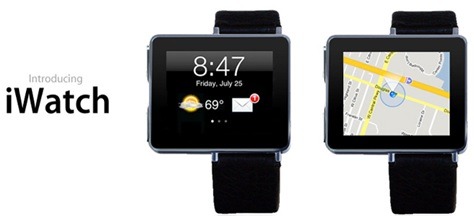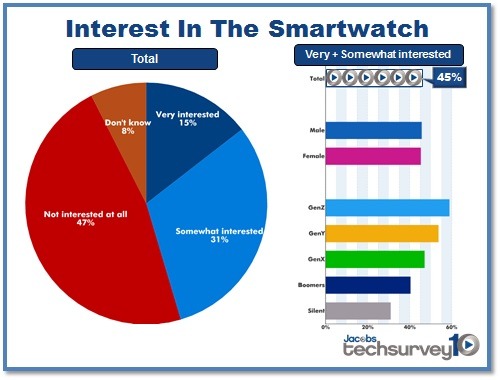Last January at CES, Paul and I made the rounds seeking out the latest in smartwatches. As you have no doubt read, heard, and perhaps experienced, “wearable technology” is being touted by many as the next big thing.
While Samsung has its Galaxy Gear (with those great TV ads), and other brands are dabbling in the space, the industry is waiting for the other Cupertino clog to drop. There is much anticipation that Apple will launch its own “iWatch” sometime this year, which many believe could be the industry game changer. Below is one of many techie “guesses” that have been generated by speculation over this non-existent product:
We are very interested in this smartwatch movement for many reasons – it is connected to smartphones and the portability piece makes radio a possible player if these techie watches take off. Like many upcoming trends, there are naysayers. You hear comments like “Why would I need a watch that does all the things my smartphone already does?”
Of course, remember that you may have uttered words like the ones below at one time or another:
“Why would anyone send a text message when you can just pick up the phone and call someone?
“Why would I ever want to get email on my phone – what’s the point of that?”
“Why would I ever want an iPad – I already have an iPhone and a laptop.”
“I’m already on Facebook – what could I possibly get from Twitter?”
And my favorite from my late father:
“Why do I need a garage door opener – I’ve spent my life getting out of the car and opening it myself.”
I miss him every day, but he typified many first knee-jerk reactions to new technology and gadgetry.
In Techsurvey10, we asked about smartwatches (and Google Glass). Here’s a sneak of what attendees at the Worldwide Radio Summit in L.A. will see next week – interest in smartwatches is already substantial, despite the fact that most people have never seen one, much less worn one:
Impressive, isn’t it? Already 45% of our sample is very or somewhat interested in these techie wearables – including an equal percentage of men and women, and clearly a positive skew toward younger generations.
So the statistical evidence suggests a lot of initial interest. But the other day I read an article that didn’t have a single number or piece of data that pretty much guaranteed the success of smartwatches, whether Apple actually launches their product this year or not.
That’s because many in the traditional watch industry are convinced these digital wrist devices are doomed. In a New York Times article the other day, Swiss watchmakers explained why consumers just won’t respond to smartwatches. Here are a few quotes that scream denial with a capital D:
Nick Hayek, CEO of Swatch, is concerned about battery life and NSA trackability: “People don’t want these complications…watches remain a piece of jewelry.”
Richard Mille, founder of the watch company that uses his name: “The arrival of Samsung and others will not hurt the luxury watch sector, and there is in fact room for everybody.”
Philippe Léopold-Metzger, CEO of Piaget: “We’re arriving at a stage where people are getting tired of technological machines, because I think they are invasive…If I go out at night or am invited to a dinner, I don’t take my phone with me.”
Where have we heard this kind of denial before?
From Kodak, scoffing at digital cameras.
From Barnes & Noble and Borders, naysaying the Kindle.
From newspapers, knocking the Internet, bloggers, and social media.
And from radio executives, denying the validity of streaming and customized channels like Pandora.
But the heart of the smartwatch dilemma plaguing these traditional Swiss watchmakers is summed up by former Swatch exec, Jean-Claude Biver, who now works for the company that owns TAG Heuer, Zenith, and Hublot:
“We can’t talk about our craftsmen working by hand and at the same time talk about the electronics of the future which has nothing to do with our line of business and Switzerland.”
 Yes, the two worlds are very different, preventing traditional watchmakers who have based their mega-prices on the artwork of their products to get behind circuitry, gadgetry, and processors.
Yes, the two worlds are very different, preventing traditional watchmakers who have based their mega-prices on the artwork of their products to get behind circuitry, gadgetry, and processors.
And thinking back to the TS10 chart that shows even greater interest among Gens Y and Z, here’s a prescient quote from Jean-Marc Jacot (pictured), CEO of high-end watchmaker Parmigiani Fleurier:
“It’s the young people of today who will decide tomorrow whether the traditional watch really is in danger or not – and it’s very easy to get that forecast wrong.”
Jacot’s comment is reminiscent of what we hear from many automakers, too; most of whom realize that their destiny is inextricably connected to the attitudes and opinions of today’s Millennials.
And substitute “radio” for “watch” in his quote, and you’ve got the truth about the future of the broadcast radio business.
Tick tock.
- Media And Technology In 2025: Believe It Or Not! - April 18, 2025
- In Radio, You Just Never Know - April 17, 2025
- The Secret To Making A Great Podcast (And Great Radio) - April 16, 2025






Even though the facts clearly state that the market share for Android far surpasses iOS, people still point to Apple first. The “industry” may be waiting, but everyone else is looking the other way.
Always fun to be on the precipice if something. We shall see. Thanks for chiming in.